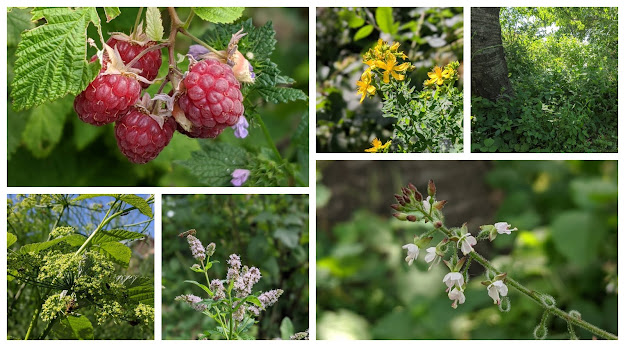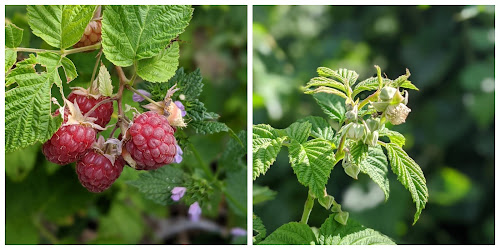With the forest garden churning out new delights and the successful hatching of broody duck number two's eggs, it's been a productive week here at the project. The annual vegetables are flourishing and the first hint of autumn is in the air with the swelling walnuts. Welcome to week 19 - The Polyculture Project.
The forest garden continues to keep giving, with berries mainly giving way to figs, pears and cherry plums. The blackberries are the thornfree cultivar, yielding an abundance of juicy blackberries from July-Sep even under fruit trees in the semi-shade. Being a vigorous plant, it provides a good amount of mulch material and/or animal fodder when pruning time comes around. Check out our range of fruit and nut cultivars available from our nursery this season.
Lupin - Lupinus polyphyllus grown from seed saved by Sophie's mum. This ornamental plant provides food for a range of useful pollinators, has good polyculture potential, and as with many plants from the Fabaceae family, can fix atmospheric nitrogen. In fact, Lupins are somewhat up and coming in this area, and although it seems more research is needed in this area, findings from this 2016 study are encouraging.
It looks like an excellent year for Juglans regia. Walnuts are monoecious, but the time the pollen sheds from the male flower does not always overlap well with the time of female flower receptivity to pollen. This condition is referred to as dichogamy. To overcome this problem growers can select another walnut cultivar (a pollinator) the male flowers of which open at the same time as the female flowers from the main cultivar. The pollinator should be situated upwind from the main crop. If you have other walnuts upwind from your site, as we do here, you should not have problems with this.
If you are interested in finding out more about Walnuts, you can check out our previous blog posts here and here. We also offer a range of cultivars from our nursery and we are taking orders now for this autumn.
Cornus kuosa - Korean dogwood
Basil - Ocimum basilicum growing in our annual polyculture, Zeno
Regenerative Landscape Design - Online Interactive Course
Want to learn how to design, build and manage regenerative landscapes? Join us for our Regenerative Landscape Design - Online Interactive Course from May 1st to Sep 13th, 2023.
We're super excited about running the course and look forward to providing you with the confidence, inspiration, and opportunity to design, build and manage regenerative landscapes, gardens, and farms that produce food and other resources for humans while enhancing biodiversity.

Regenerative Landscape Design Online Course
You can find out all about the course here and right now we have a 20% discount on the full enrollment fees. Just use the promo code RLD2023 in the section of the registration form to receive your discount.
We are looking forward to providing you with this unique online learning experience - as far as we know, the very first of its kind. If you are thinking of reasons why you should do this course and whether this course is suitable for you, take a look here where we lay it all out. Looking forward to it!
We're super excited about running the course and look forward to providing you with the confidence, inspiration, and opportunity to design, build and manage regenerative landscapes, gardens, and farms that produce food and other resources for humans while enhancing biodiversity.
 |
| Regenerative Landscape Design Online Course |
You can find out all about the course here and right now we have a 20% discount on the full enrollment fees. Just use the promo code RLD2023 in the section of the registration form to receive your discount.
We are looking forward to providing you with this unique online learning experience - as far as we know, the very first of its kind. If you are thinking of reasons why you should do this course and whether this course is suitable for you, take a look here where we lay it all out. Looking forward to it!
Welcome to our Online Store where you can find Forest Garden/ Permaculture plants, seeds, bulbs and Polyculture multi-packs along with digital goods and services such as Online Courses, Webinars, eBooks, and Online Consultancy. We hope you enjoy the store and find something you like :) It's your purchases that keep our Project going. Yuu can also find our full list of trees. shrubs and herbs for forest gardens on our website here
Photos from the Forest Garden
Below is a labeled photograph of a 5 layer polyculture we have growing in an open area of our forest garden.
The bulb layer cannot be seen as it has died off now and consists of Tulipa sp. - Tulip - Nectaroscordum siculum - Bulgarian Honey Garlic - Muscari neglectum- Grape Hyacinth and Narcissus poeticus - Poet's Narcissus. We're looking forward to planting some of our new Allium spp. into the available space this autumn.
There is also a new layer that has emerged over the last few weeks - a third duck nesting in there with eggs due to hatch in 2 weeks or so :)
A side note that you may find interesting. The Spartium junceum was reduced by approx 50% in early spring of this year and the regrowth has produced flowers that have just opened. Normally this plant flowers in early June. A second Spartium junceum I pruned at the same time that was in a more shady position did not produce any flowers.
Regenerative Landscape Design - Online Interactive Course
Want to learn how to design, build and manage regenerative landscapes? Join us for our Regenerative Landscape Design - Online Interactive Course from May 1st to Sep 13th, 2023.
We're super excited about running the course and look forward to providing you with the confidence, inspiration, and opportunity to design, build and manage regenerative landscapes, gardens, and farms that produce food and other resources for humans while enhancing biodiversity.

Regenerative Landscape Design Online Course
You can find out all about the course here and right now we have a 20% discount on the full enrollment fees. Just use the promo code RLD2023 in the section of the registration form to receive your discount.
We are looking forward to providing you with this unique online learning experience - as far as we know, the very first of its kind. If you are thinking of reasons why you should do this course and whether this course is suitable for you, take a look here where we lay it all out. Looking forward to it!
We're super excited about running the course and look forward to providing you with the confidence, inspiration, and opportunity to design, build and manage regenerative landscapes, gardens, and farms that produce food and other resources for humans while enhancing biodiversity.
 |
| Regenerative Landscape Design Online Course |
You can find out all about the course here and right now we have a 20% discount on the full enrollment fees. Just use the promo code RLD2023 in the section of the registration form to receive your discount.
We are looking forward to providing you with this unique online learning experience - as far as we know, the very first of its kind. If you are thinking of reasons why you should do this course and whether this course is suitable for you, take a look here where we lay it all out. Looking forward to it!
--------------------------------------------------------------------------------------------------------------------------
Support Our Project
If you appreciate the work we are doing you can show your support in several ways.
- Make a purchase of plants or seeds from our Bionursery or Online Store
- Consider joining us for one of our Courses or Online Courses
- Comment, like, and share our content on social media.
- Donate directly via PayPal to balkanecologyproject@gmail.com or via FTX Pay
If you appreciate the work we are doing you can show your support in several ways.
- Make a purchase of plants or seeds from our Bionursery or Online Store
- Consider joining us for one of our Courses or Online Courses
- Comment, like, and share our content on social media.
- Donate directly via PayPal to balkanecologyproject@gmail.com or via FTX Pay
 |
| You can also register for our online training, services, and products directly here. |








































